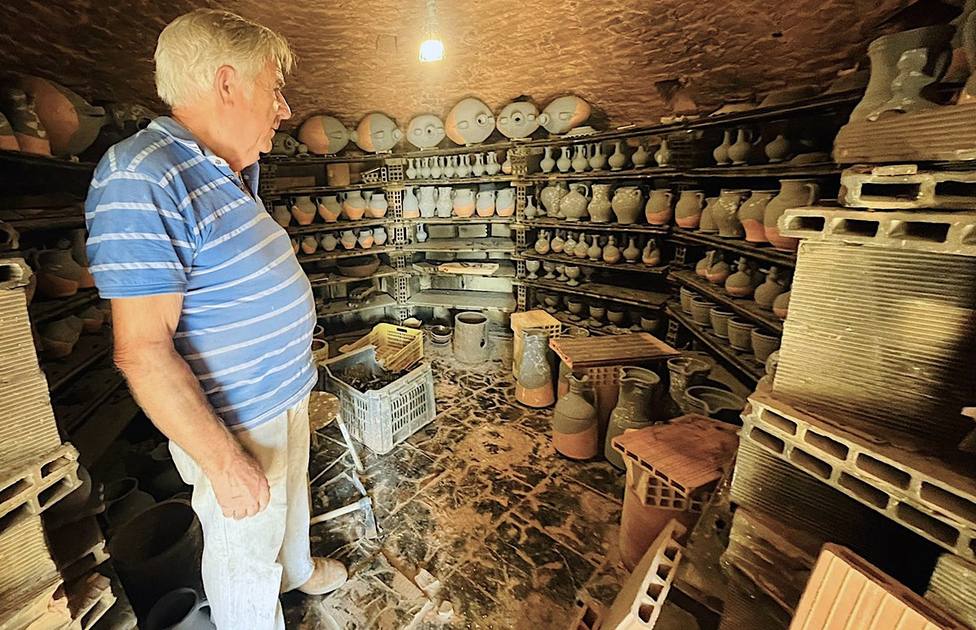ACTUALIDAD

UN HORNO ÁRABE FAMILIAR VUELVE A LA VIDA
Un antiguo horno árabe vuelve a estar en funcionamiento gracias a la alfarería de Melchor Tito de Úbeda y Factum Arte, recuperando así, una tradición ancestral y abriendo una nueva era en este oficio, que resulta milenario.
A sus 82 años, Tito, hijo y padre de maestros alfareros, han recobrado la ilusión por este oficio gracias a la reactivación del horno árabe del alfar familiar.
“Creía que nunca más iba a ver este horno repleto de piezas para su cocción, ha sido algo emocionante, sobre todo ver a mi nieta con tanta ilusión siguiendo el proceso de cocción de las piezas”, explica Tito.
El horno llevaba inactivo casi dos décadas debido a que las nuevas demandas de los mercados ya no lo hacían competitivo.
El pasado 29 de septiembre de 2023, este horno árabe volvió a estar en funcionamiento, dando forma de manera conjunta a 5.000 piezas cerámicas en un proceso de cocción que se prolongó durante 36 horas, con temperaturas por encima de los 1.000 grados y consumiendo 6.000 kilos de orujo en su combustión y 4.000 de leña.
La alfarería forma parte de la tradición de la Península Ibérica desde hace 8.000 años. En Úbeda, poco después de la conquista cristiana, hacia 1233, ya existen documentos sobre trabajos de tejeros y olleros. Con este horno árabe, los alfareros locales vuelven a trabajar el barro como se hacía hace más de 300 años.
Úbeda, en 2023, fue declarada como Bien de Interés Cultural (BIC) con la tipología de Actividad de Interés Etnológico por la Junta de Andalucía. Así, la alfarería es una técnica artesanal muy exigente, tanto en el momento de concepción de las piezas, como en el resultado. Además, es un sector floreciente en toda Andalucía, una de las comunidades con mayor número de artesanos y talleres de España, con casi 7.000 empresas (más del 18% del conjunto del país) y que proporciona trabajo a unas 20.000 personas, suponiendo en torno al 19% de todo el empleo del sector a nivel nacional.
Por otro lado, dentro del Plan Integral de Andalucía para la mejora del sector, la Junta de Andalucía ha puesto en marcha el proyecto “Artesanía con A de Andalucía”. De esta manera, casos como la reactivación de este horno árabe, permitirá conservar la tradición mirando hacia un futuro enriquecedor para esta práctica ancestral.
__
An old Arabic kiln is back in operation thanks to the pottery of Melchor Tito de Úbeda and Factum Arte, thus recovering an ancestral tradition and opening a new era in this millenary craft.
At 82 years old, Tito, son and father of master potters, has regained his enthusiasm for this craft thanks to the reactivation of the Arabic kiln in the family pottery.
“I thought I was never going to see this kiln full of pieces for firing again, it has been exciting, especially to see my granddaughter with such enthusiasm following the firing process”, explains Tito.
The kiln had been inactive for almost two decades because the new market demands no longer made it competitive.
On 29 September 2023, this Arabic kiln was back in operation, shaping 5,000 ceramic pieces in a firing process that lasted 36 hours, with temperatures of over 1,000 degrees and consuming 6,000 kilos of pomace and 4,000 kilos of firewood.
Pottery has been a part of the Iberian Peninsula’s tradition for 8,000 years. In Úbeda, shortly after the Christian conquest, around 1233, there are already documents about the work of potters and weavers. With this Arab oven, the local potters return to working clay as they did more than 300 years ago.
Úbeda, in 2023, was declared an Asset of Cultural Interest (BIC) with the typology of Activity of Ethnological Interest by the Junta de Andalucía. Thus, pottery is a very demanding craft technique, both in the moment of conception of the pieces, as well as in the result. Moreover, it is a flourishing sector throughout Andalusia, one of the communities with the highest number of craftsmen and workshops in Spain, with almost 7,000 companies (more than 18% of the country as a whole) and which provides work for some 20,000 people, accounting for around 19% of all employment in the sector at national level.
On the other hand, within the Andalusian Integral Plan for the improvement of the sector, the Andalusian Regional Government has launched the project “Artesanía con A de Andalucía” (Crafts with A for Andalusia). In this way, cases such as the reactivation of this Arab oven will allow the tradition to be preserved, looking towards an enriching future for this ancestral practice.
__
